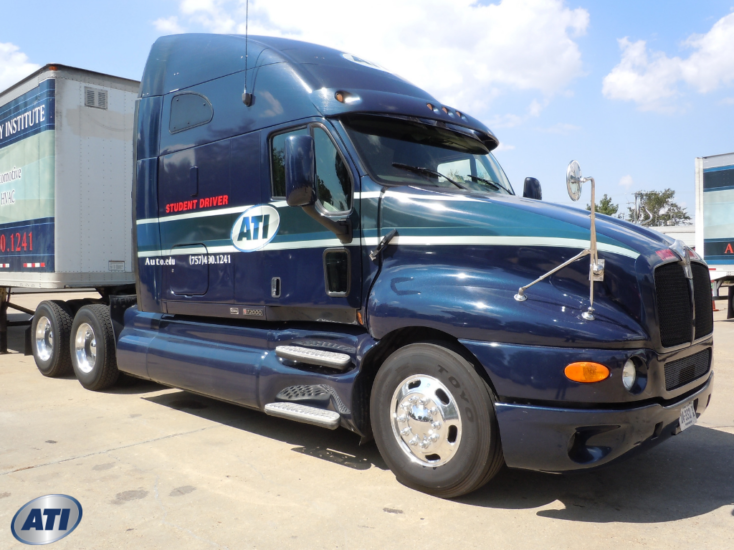Is Truck Driving a Good Job for Me in Virginia?

How does the idea of making a living on the open road sound? One of the few employment opportunities that offers such a privilege is truck driving. Truck drivers deliver items throughout the U.S. and sometimes beyond the borders.
Think about the products you use on a daily basis, most of them were delivered to the store by a trucking company. Truckers are an important part of the daily operations of different industries including manufacture, retail, automotive and food, and there’s always a high demand for professionals truckers.
Why consider a Trucking Career?
Adventure
Do you enjoy traveling? While some people are satisfied with sitting and working in the same place every day, most of us have an inner desire to explore the world, see new places, and meet new people. From the Pacific and Atlantic shorelines to the mountain peaks of the Rockies, a career as a truck driver will give you the opportunity to explore the U.S.
Job security
It has become a common thing for news anchors today to air companies across the U.S. that are downsizing and laying off workers. However, trucking is one of the few industries that has enjoyed job security. Additionally, there is a shortage of truckers across the nation.
Benefits
On top of a steady paycheck, commercial truck drivers usually enjoy other benefits like retirement plans, health insurance, performance pay, paid vacations, and 401K among many others.
What is Truck Driving Like?
Although truck driving is the most common job in almost half of the U.S. states, most people are unclear on what the life of a trucker is really like. Just like other jobs, every truck driver’s experience is different, but there are a few universal components like:
Driving limits: Truck drivers work up to 70 hours in a span of eight days, and they aren’t allowed to exceed this number of working hours. Additionally, there are daily driving limits to avoid fatigue. Truck drivers cannot exceed 11 hours per day. After driving for 70 hours per week, truckers have to go for a mandatory 34 hours off. These limits help drivers to safely arrive at their destinations.
Shift flexibility: Truckers often choose when they want to take their shifts which can be either in the morning or at night. Both shifts have their own advantages, for instance, driving at night has less traffic while daytime provides better visibility. Although some trucking companies have their specific shifts, others are less stringent and truck drivers don’t have to commit to specific starting hours.
Several miles under the treads: An average truck driver covers at least 500 miles on a single day. Because most truckers work for a maximum of 70 hours over an eight-day period, truckers cover nearly 130,000 miles per year.
Rules and Regulations for Drivers from the Commonwealth of Virginia
According to the DMV, you should be at least 18 years to hold a CDL. Those below the age of 21 years can only be issued with a CDL L. The L restriction means that you may only be able to drive in Virginia. If you want to transport interstate freight, drive across state lines, and transport hazardous material, the Federal law requires you to be over 21 years.
To learn how to drive a commercial vehicle, the Commonwealth of Virginia dictates that you must have a CDL instruction permit. You also have to pass the compulsory CDL general knowledge exam and the knowledge exams for the specific vehicle you want to drive.
How to get your CDL
There are requirements that you must meet before you obtain your CDL, including:
Proof of identity: This can be your birth certificate, driver’s license, a Virginia CDL instruction permit, active U.S. military ID or discharge papers. According to the DMV 141, the documents you provide should be originals. Photocopies are not accepted.
Proof of Virginia residency: This includes your Virginia address. Keep in mind that a business address or post office box isn’t acceptable.
Proof of legal presence: This can be your passport, birth certificate, or other documents such as a certificate of Citizenship.
Social security number proof: This may include your social security card, payroll check, IRS W-2 form, active military ID, or tax return documents from the previous year.
While you don’t need any formal training to become a truck driver, most trucking companies and big organizations won’t hire you without training. Since, after all, the trucking company would then have to train you themselves. If you’re interested in becoming a truck driver and taking the commercial driving course, visit Advanced Technology Institute today for more information on the courses we offer!
Industry Knowledge
Welcome to the Advanced Technology Institute's Blog, your resource for industry insights and discussions on technologies shaping the future of automotive, heavy vehicle, hvac, welding, and other related career paths.
Explore how ATI's curriculum and hands-on learning opportunities can propel your career in the tech-driven world.






